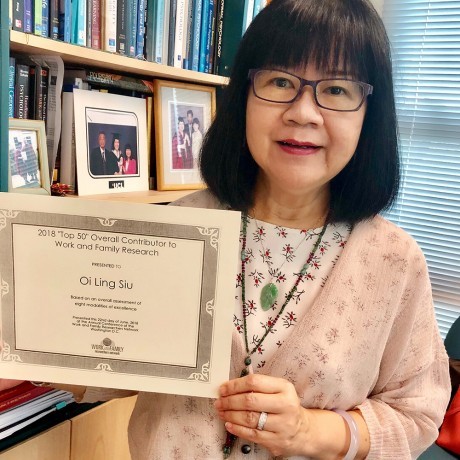
Lam Woo & Co Ltd Chair Professor of Applied Psychology
Professor Siu Oi Ling
The psychology of healthier lives and societies
Applied psychologists are not the type to remain locked in any academic ivory tower. Instead they aim to get out into the world and offer practical solutions to many of the real-life problems faced by individuals and societies.
Professor Siu Oi-ling, Lingnan’s Lam Woo & Co Ltd Chair Professor of Applied Psychology has built up an impressive track record of work in the fields of occupational stress and work-family interface. The sole Chinese scholar recognised by the Work and Family Researchers Network as a 2018 Top 50 Overall Contributor to Work Family Research, she has also completed an Occupational Safety and Health Council project in 2019, which revealed the substantial cost of occupational stress to Hong Kong’s economy.
As a consultant, she has been commissioned by Hong Kong’s MTR Corporation to look at the safety culture within the rail network business, and by the city’s Education Bureau to provide training to teachers to equip them to help students cope with unhealthy levels of stress.
Studying the drivers of road safety
Professor Siu is keen to attract high-calibre postgraduate students from around the globe to Lingnan’s RPG programme. A significant proportion of those who have already come to pursue their research at the university have been funded by the Hong Kong PhD Fellowship Scheme, which is considerably more generous than that provided under UGC terms.
Among the PhD projects she has supervised, Professor Siu picks out one pursued by a female student from Pakistan as particularly noteworthy. “This looked at traffic behaviour and safety, based on psychological factors, and the personality types that are more or less likely to have accidents,” she explains.
There were three distinct parts to their work. “In the first year our joint study looked at existing data from China.” Professor Siu arranged for her student to collaborate with scholars from a famous research centre in Guangzhou on an examination of the factors leading to traffic accidents and injuries in Guangdong.
“In the second year, she collected data from Pakistan and also investigated driving behaviour there. In addition, she spent a term at the University of Stirling in Scotland, as an exchange student, collaborating with an associate professor on risk-seeking aversion experiments.”
Research areas worth focusing on
Professor Siu says she would encourage her PhD students to consider focusing on the mental health and well-being of young people and employees, and the counselling approaches that could be effective in alleviating their distress. She notes that a colleague of hers in the psychology department has studied the use of cognitive behavioural therapy to enhance mental health.
“One of my PhD students is looking at irrational beliefs, and the way in which these lead to negative emotions and to a deterioration in well-being.” This process is also of considerable interest to employers as it is likely to impact on workplace performance. The study will test the effectiveness of specific types of training in enhancing the participants’ well-being.
Advice for RPG students
Professor Siu suggests it’s unwise for postgraduate students to wait until they’ve read everything in the library before beginning to write. “For a PhD study they also have to narrow down to one specific topic. Over-ambition will lead to confusion and make it difficult to ever start.”
However, she adds, it is important they do read around their topic as this will help them in building the theoretical framework for the study. “With a good framework, you can successfully develop your hypotheses, collect your data and test them. This will contribute to theory development, which is important in its own right, but can also lead to publications.”
In addition, she urges RPG students to take an advanced statistics course, as the possession of such skills can have a considerable impact on the quality of their research work.
Finally, Professor Siu has one, more general, recommendation. “I also want to encourage them to work hard and play hard, as then they will find that life is not that hard.”

